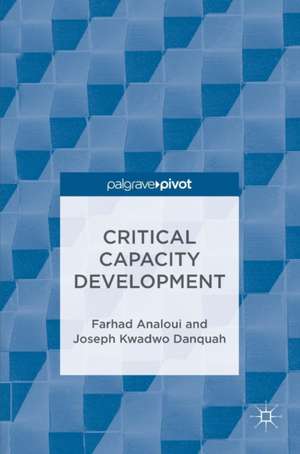Critical Capacity Development
Autor Farhad Analoui, Joseph Kwadwo Danquahen Limba Engleză Hardback – 31 ian 2017
| Toate formatele și edițiile | Preț | Express |
|---|---|---|
| Paperback (1) | 411.75 lei 43-57 zile | |
| Springer International Publishing – 13 iul 2018 | 411.75 lei 43-57 zile | |
| Hardback (1) | 420.79 lei 43-57 zile | |
| Springer International Publishing – 31 ian 2017 | 420.79 lei 43-57 zile |
Preț: 420.79 lei
Nou
Puncte Express: 631
Preț estimativ în valută:
80.53€ • 83.59$ • 67.15£
80.53€ • 83.59$ • 67.15£
Carte tipărită la comandă
Livrare economică 24 martie-07 aprilie
Preluare comenzi: 021 569.72.76
Specificații
ISBN-13: 9783319474151
ISBN-10: 3319474154
Pagini: 134
Ilustrații: XVII, 134 p. 5 illus., 3 illus. in color.
Dimensiuni: 148 x 210 x 17 mm
Greutate: 0.4 kg
Ediția:1st ed. 2017
Editura: Springer International Publishing
Colecția Palgrave Macmillan
Locul publicării:Cham, Switzerland
ISBN-10: 3319474154
Pagini: 134
Ilustrații: XVII, 134 p. 5 illus., 3 illus. in color.
Dimensiuni: 148 x 210 x 17 mm
Greutate: 0.4 kg
Ediția:1st ed. 2017
Editura: Springer International Publishing
Colecția Palgrave Macmillan
Locul publicării:Cham, Switzerland
Cuprins
1. Why Capacity Development? .- 2. Management Perspectives and Trajectory of Capacity Development .- 3. Capacity Development in context of Development: A Critical Debate .- 4. Capacity Development: The World Bank and UNDP Perceptive .- 5. Uses of Capacity Development in the Development Practice .- 6. Capacity Development and Institutional Change: Impacts on Development Projects in Sub-Saharan Africa .- 7. Conclusion: Current Thinking in Capacity Development, Vision and Implications.
Notă biografică
Farhad Analoui is Professor International Development and HRM, International consultant, and Programme Director at the Centre for International Development, University of Bradford, UK.
Joseph Kwadwo Danquah is Doctoral Research Associate at the Centre for International Development, University of Bradford, UK.
Textul de pe ultima copertă
This book contributes to our understanding of a neglected and poorly-understood concept within the development field: ‘capacity development’ in the context of international human and organisational sustainable development. Relating ‘capacity development’ to other perspectives in development thinking and practice and providing an account of the concept’s genesis, the book introduces readers to contemporary empirical research initiatives that help to elucidate the concepts of capacity, capacity development, and capacity management. While capacity development initiatives and programmes have been used by most governments, third-sector organizations, and international and national agencies over the course of the last five decades, the term means different things to different people and especially to different major players and stakeholders in the international community. This weakens its effectiveness, hence the need for unification. This book therefore strives first of all to set ground rules that can be utilised by international aid providers such as UNDP, OECD, World Bank, and CIDA and practitioners alike.
Caracteristici
Fills a gap, articulating a coherent conceptual framework for capacity development and clarifying the disparate ways that the concept has been understood and applied Draws on three case studies and empirical examples from both developed and developing countries Critically examines capacity development and its implementation, identifying challenges Makes concrete policy recommendations to achieve desired outcomes


